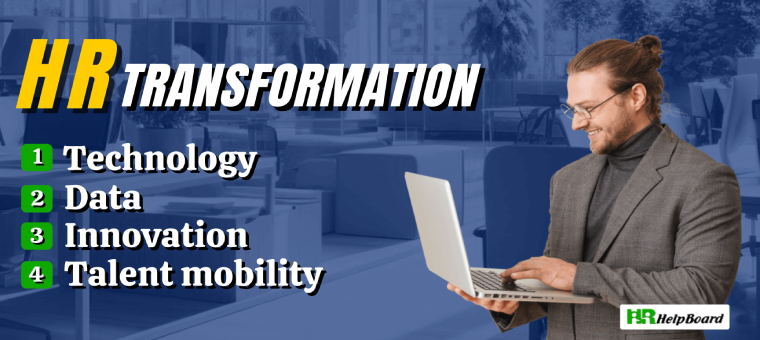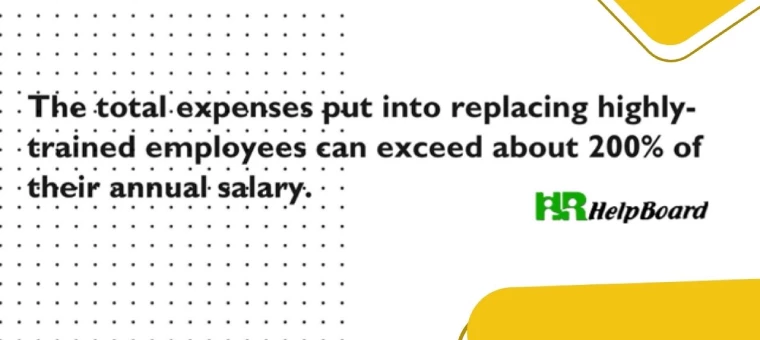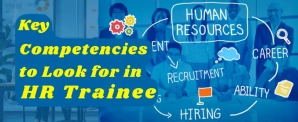
HR Transformation: Why Your Startup’s Digital Transformation Plans Should Include It
The startup world is gearing up for a big year in 2024. With more than 1215 billion dollar startups in the world as of 2024, there is a lot of funding to go around. However, this does not mean that just about any startup can become a unicorn. In fact, according to experts, 9 out of 10 startups fail eventually and 1 out of 5 startups fail in the first year.
The key to developing a startup idea rests largely on three factors - capital, tech and human expertize. Naturally, businesses want to recruit and nurture talent that aligns them with the best value chains for their long-term success. But doing this requires not only processing business cycles through a digital transformation-driven landscape but also recruiting professionals in a highly competitive market.
To address the need for quality human assets, startups must consider digital HR transformation as an integral part of their working cycle. Let’s look at how digital and HR transformation work together to deliver successive market value to startups, SMBs and MSMEs:
Table of Content
What is HR Transformation and How Does it Affect Startups?
HR Transformation is the process of creating a dynamic human capital management process. It converges, people, processes and tech into a nexus of productivity-driven performance. It is a direct derivation of digital transformation that defines the best-in-class startups across the world today. Broadly speaking, this quote taken from a Deloitte Insights blog sums up what digital transformation is doing and how digital HR transformation strategies is directly part of it:
“The relationship between intelligent technology and workers has evolved significantly over time. At first, technology was used as a substitute for workers, automating them out of tasks that were dull, dirty, dangerous, or disconnected. Next, it was used to augment workers, functioning alongside them as a tool that provided additional or enhanced capabilities and insights. We referenced these trends in previous reports as super jobs and super teams, which have continued to accelerate thanks to how technologies are advancing. Now, we’re seeing technologies emerge that aren’t just a substitute or supplement for workers but actually help them improve who they are—enabling humans to become better humans and teams to become better teams. "
So, HR transformation not only syncs brands with professionals but also tech at their industry’s cutting-edge. The shift in job roles and process integration enables businesses to react effectively and remain agile for upcoming paradigm shifts. This is crucial for startups since they get to enhance productivity via skill uptake and orientation.
According to McKinsey, one of the key indicators of a business’ organizational health has to do with HR transformation models and human capital’s technical agility. They refer to this as talent mobility and link that up directly with the ongoing digital uptake and transformation process. Here’s an excerpt from this McKinsey blog, “These latest OHI findings [show that], three trends in particular stand out: how leaders are leading; the links between technology, data, and innovation; and the value of talent mobility.”
 This blog further explains how the deployment of dynamic talent is crucial for businesses to achieve lasting success and profitability. So, your digital HR transformation roadmap for reskilling and upskilling as part of a “special transformation project” enables businesses to deliver better long-term business prospects. So, let’s look at how the HR transformation process benefit businesses undergoing digital transformation.
This blog further explains how the deployment of dynamic talent is crucial for businesses to achieve lasting success and profitability. So, your digital HR transformation roadmap for reskilling and upskilling as part of a “special transformation project” enables businesses to deliver better long-term business prospects. So, let’s look at how the HR transformation process benefit businesses undergoing digital transformation.
5 Key Reasons Why You Must Consider HR Transformation as Part of Your Digital Transformation Process
Lets explore about 5 reasons, which must be considered for HR transformation:
Effective Tech Orientation
The biggest drivers for a business’ success all stem from technology. Yet one of the biggest limitations that businesses find themselves is the lack of effective hierarchical definition and management. The reason why this is important is simple – companies must create a dynamic human capital structure to benefit from technology uptake. Without that kind of infrastructure to capitalize on, companies continue to face redundancies and fail to recognize the fu benefits from their tech upgrade.
Further, businesses that invest in an adaptive HR transformation strategy that includes market-sensitive promotions, team reskilling and reshuffling stand to get more from their human capital. Consider this blog by Bain and Co which mentions, “Many of [the new jobs] draw on skills like empathy, creative problem solving, judgment, or personal communication—those skills where humans have a distinct advantage over machines.” Tapping into human resource values that go over and above mechanical performance require digital HR transformation across the company. This helps create agile teams and effective leaders who drive businesses through streamlined operational cycles.

Efficient Delegation Practices
Tech uptake and efficient hierarchical modeling is only part of the process when it comes to a well-designed digital HR transformation roadmap. However, it does enable leaders and managers to identify and develop talent accordingly. It also helps them delegate tasks and develop team compositions based on talent combined with technology. The resulting benefit for companies comes from orienting more effectively to emerging tech, strategic development of niche expertise and significantly higher overall output.
For startups and SMBs, the ability to delegate tasks is crucial for handling projects effectively. When paired with technology like generative AI, understanding specialized skills and how to leverage them makes up a lot of the project management process. Further, it also adds functional value to performance management elements in the overall human resource management process. This process really goes into defining a robust digital HR transformation strategy.
Better Employee Productivity and Turnover
Streamlining tech with talent is an obvious win-win for companies, especially startups. However, it also increases overall productivity by enabling teams to specialize in their particular area of expertise. It also sets clear goals and performance parameters which enables an active and metric-enabled feedback loop. Leaders use HR transformation models to create realistic goals, project their goals forward for potential investors and provide actionable insights to their teams.

Consequentially, businesses see a better year-on-year employee turnover thanks to increased job satisfaction and career growth. They also feel like they are more directly involved in the company’s working process and continue to invest their professional expertise in it. For startups, this is particularly important since they get to nurture talent and avoid the pitfalls of poor hiring and employee retention. Startups offering ECAS options stand to get extra benefits since employees are far more likely to remain with the company for longer.
Higher Investment and Client Retention
Any company’s HR transformation process is a running tally of human capital allocations that showcase startups’ ability to manage their ongoing operations effectively. The relevant profile development and team composition ensure that companies feature their best selves for the market. This is particularly useful for startup entrepreneurs and solo businesspersons who want to attract investors. A high employee satisfaction rate and strong organizational health index (OHI) performance is a great way to showcase investment viability to investors.
Further, digital transformation-based innovation or operational changes increase client retention by providing better results. This also showcases a strong potential for valuable return and therefore, viable investment opportunities. In particular, how a startup reshuffles its employees to suit its growing client portfolio showcases business intelligence agility. This is a great opportunity for businesses to attract investors with legitimate strategies that kill many birds with one stone.
Increased Adjacency-based Growth
The best businesses in the world, including startups, experience rapid growth in their initial phases. However, that growth drops off unless they either refine their process or otherwise, adopt adjacent processes. The digital HR transformation process enables businesses to create human capital value along the lines of their best possible growth potential. Leaders get to see how they can expand their business prospects and align with major market trends. This also makes them more competitive while enabling them to take calculated risks.
This method is a popular choice for many businesses including global leaders like Nvidia. In fact, a recent Forbes article mentioned how Nvidia CEO Jensen Huang personally invests time with high-ticket merger prospects. Traditionally, this role is handled by M&A executives but Huang’s approach highlights how Nvidia is positioning itself in the market through the strategic application of human resources.
What Does HR Transformation Hold for Your Startup’s Digital Transformation Journey?
Digital transformation is an ongoing process and HR transformation is inherently part of that journey. Startups integrating digital HR transformation as a direct part of their growth process enables an adaptive and agile approach. Also, understanding how startups are plotting their digital HR transformation roadmap to support their digital transformation enables them to make the most of their tech investments. For more insights about how HR transformation belongs right in the digital transformation deck, check out this Forbes article. We will be looking at the most popular and viable HR transformation models by industry in the future. So, stay regular with our blog and also consider subscribing to our newsletter to get the latest from us right in your inbox!
Latest JobsView All
-
 Sr Manager - Brand & Communication @ De... Delhi 12 Nov 2025
Sr Manager - Brand & Communication @ De... Delhi 12 Nov 2025Ascent Human Solutions Pvt. Ltd..
-
 Assistant Manager/ Manager - Sales MV ... 13 Nov 2025
Assistant Manager/ Manager - Sales MV ... 13 Nov 2025Ascent Human Solutions Pvt. Ltd..
-
 Senior Manager - Business Development -... Gurgaon 13 Nov 2025
Senior Manager - Business Development -... Gurgaon 13 Nov 2025Ascent Human Solutions Pvt. Ltd..
-
 Area Sales Manager @ Ghaziabad... Delhi 12 Nov 2025
Area Sales Manager @ Ghaziabad... Delhi 12 Nov 2025Ascent Human Solutions Pvt. Ltd..
-
 Senior Manager Marketing – K 12 Busin... New Delhi 12 Nov 2025
Senior Manager Marketing – K 12 Busin... New Delhi 12 Nov 2025Ascent Human Solutions Pvt. Ltd..
RELATED ARTICLES
-
Law & Compliances Integrating Local Law 152 Gas Inspections Into Your Annual B... Explore
-
Human Resource Key Competencies to Look for in HR Trainees Explore
-
-
Performance management Employee Happiness and Workplace Happiness 2025 Explore
-
Performance management Boosting Employee Engagement and Knowledge Retention through... Explore
-
Human Resource Why Employee Voice Matters? Explore
-
-
-
Human Resource HR Planning - How to Manage Your Leave Policy Structure Explore
-
Human Resource Mastering Leadership: The Three C's of Success Explore
-
-















